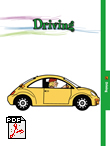- TOOL KITS
- A. The NEXT Step
- B. Promoting Independence
- C. Phone Apps
- D. Return to Work
- E. Motivational Interviewing
- F. Paediatric Brain Injury Rehabilitation Resources
- a) Introduction
- 0. Introduction
- 1. Transition
- 2. The transition wheel
- 3. Walking around the transition wheel
- 4. The transition wheel interview
- 5 . Using this kit
- 6 . Web resources
- b) Working together
- 7. My role
- 8 . My family's role
- 9. My case manager's role
- c) What can I do?
- 10. Who, where, what? The Services I receive
- 11. Accommodation
- 12. Driving
- 13.Alcohol and drugs
- 14. Social and recreational activities
- 15. Health and well-being
- 16. Relationships and friendships
- 17. Sexuality
- 18. Personal safety
- 19. Complaints/rights
- 20. Legal issues
- 21. Centrelink
- 22. Financial
- 23. Shopping
- 24. Employment, training and tertiary education
12. Driving
JUST because you have a brain injury it does not mean that you will not be able to drive. But driving is a complex activity. Lots of things can affect your ability to drive. These include:
- Reduced concentration – which could affect your ability to make a quick decision. It is always a good idea not to drive when you are tired as this also reduces your concentration.
- Slow thinking – which can also affect how quickly you make decisions, your ability to plan ahead and how much information you are able to take in at once, especially the information on road signs.
- Medications – some can affect your co-ordination and reaction times.
- Difficulty with vision – could cause you not to see signs, other cars or hazards (such as people on bicycles). You could also misjudge other people’s speed or distances between you and other objects.
- Physical difficulties - such as muscle weakness may mean you have trouble with your co-ordination and this may make your reaction times slower.
- Epilepsy, dizziness, fainting and other medical conditions can be very dangerous while driving and may mean you are not able to drive for a while.
When you apply to get a learner’s licence you will need to fill out an “Application for a Licence”. This form contains questions about your medical conditions, any disabilities and any medications you are taking that could affect your ability to drive. If you have any of the things listed above you may need to answer ‘YES’ to some of these questions.
Do not worry straight away! Answering YES does not mean that you will not be able to drive. It may mean you need to collect a bit more information. You may have to ask your doctor to complete a medical assessment and possibly have an Occupational Therapy driving assessment to make sure you will be safe on the road. If you think you may need one of these contact your local RTA and talk with them about what you may need.
What if I do need an Occupational Therapy Driving Assessment?
You can get a list of Occupational Therapists that are qualified to undertake driving assessments from your local RTA office. Or you can contact the Occupational Therapy Association of Australia to get the contact details of an OT that is close to where you live.
Contact: The RTA on 13 2213 or go to the RTA web site
OT Australia NSW on (02) 9648 3225 or the OT Australian web site
If you do have some of the difficulties that can affect driving they can usually be sorted out with a few lessons or some specialised equipment.
There will be fees associated with gaining your drivers licence. It is a good idea to ask the RTA or an occupational therapist about this.
If you have any questions contact the RTA or an Occupational Therapist at your brain injury service.


